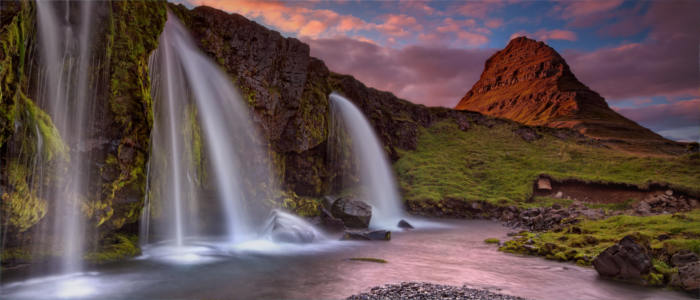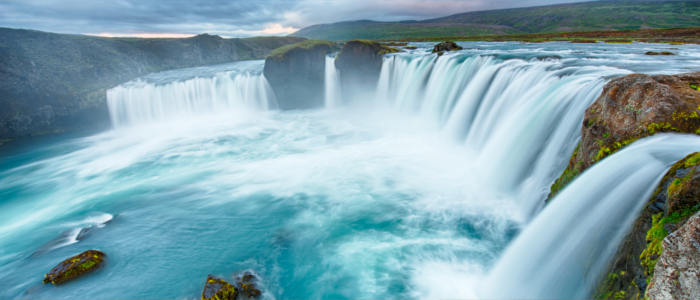Travel Offers
Travelmyne Featureprint
Distance
Iceland - A Wild Volcanic Island Made of Fire and Ice
There is hardly any other country which offers this many opposites on such a small area. The high water fountains of the bubbling geysers are not far away from the gigantic icebergs in the shiny glacial lakes. With its fuming volcanoes and nature, Iceland is one of the world's biggest adventures.

Geography - The island in the Arctic Ocean
Iceland is the second largest island country in Europe after Great Britain. It lies south of the Arctic Circle and is divided into eight regions. About a third of the population lives in Reykjavík, which is the northernmost capital on earth. The Arctic climate is rather cold throughout the year. It is only 13 °C in summer but relatively mild in winter with 1 °C. The Gulf Stream is the reason why Iceland does not cool down any further.

Nature - Hot springs and icy glaciers
The name "Iceland" is somewhat misleading because the island is not completely covered in snow and ice. There are many green plains, ochre-coloured mountains, brown gorges, milky white crater lakes, blue glaciers and deep black beaches. Strictly speaking, Iceland is not an island either but the greatest volcano on earth. Iceland's most appealing feature is its wild nature. It has so many waterfalls that not even all of them have been named. In addition, bizarre rock formations resembling a moon landscape and the world's most active volcanoes make adventurers' hearts leap for joy. Volcano Hekla has erupted 16 times so far and as it is active to the present day, it is often called the "Gateway to Hell". The influence nature has on human life was demonstrated by Eyjafjallajökull volcano when it emitted a gigantic ash cloud in 2010, which paralysed air traffic for days. Fire under the surface of the earth comes up and creates eerily beautiful natural spectacles such as geysers and thermal springs. Nearby you see gigantic glaciers, sparkling ice caves and bright glacial lakes, which were able to develop because of the Arctic climate. Iceland was born from fire and ice and is still characterised by these two extremes.

Natural sights - Extraordinary natural spectacles
Most travellers visit Iceland because of its abundance of breathtaking natural phenomena. The bird reserve at Lake Mývatn with its volcanoes, craters and lava fields is particularly popular. Nearby you see Dimmuborgir with its lava fields, the waterfalls of Dettifoss and Goðafoss, the deep cave systems and the thermally heated lakes, which are over 60 °C hot. Some bubbling natural pools are cooler and can be used for bathing. Besides the volcanoes, Iceland's many waterfalls are the country's landmark. The Gullfoss ("Golden Falls") is one of the greatest waterfalls in Europe. A few metres away you find Skógafoss waterfall. Visitors can reach most sights via the Ring Road. In the Skaftafell National Park, you can go on a unique glacier hike, marvel at icebergs and look into deep gorges. Europe's greatest glacier, Vatnajökull, is located near the Jökulsárlón Lake, one of the most beautiful glacial lakes on earth. Holidaymakers can move around the gigantic icebergs in the lake on an amphibious boat and receive an impression of the country's power. This power is also apparent from Iceland's most famous geyser - Strokkur. Historical records mention fountains with heights of up to 60 metres. Yet another side of the country is shown in the west. The landscape changes to a breathtaking world of fjords and bays here as can be found in Norway and Sweden. Iceland is also known for its Icelandic horses, which live in the wild to the present day. They live at the black beaches and are trusting and friendly towards visitors.

Culture - Vikings, goði and the Edda
Several discoverers claim to have been the first one to find the Nordic island. One of the first was probably the Viking Garðar Svavarsson, who arrived in 870 and named the island "Gardarsholm" after himself. However, excavations have shown that there must have been earlier settlements by unknown tribes. The first documented settlers came from Norway. Norwegians and Celts made themselves at home on the island in the 9th and 10th century and one of the earliest parliamentary systems in Europe emerged - the goði. An impressive culture developed in the far north and gave rise to one of the best-known and oldest literary works of Scandinavian mythology - the Edda. In the 13th century, Iceland became part of Norway but a century later Denmark ruled the country. Iceland only regained independence in 1918. The modern population lives in accordance with the country's natural beauty and maintains its customs and traditions.

Cultural sights - Reykjavík's cultural scene
Over 90 percent of Iceland's inhabitants live in the cities, a majority in the capital. Reykjavík is one of the youngest European capitals as it was founded in the 19th century. It lies in a bay at the seaside and takes advantage of the country's powers. The numerous hot springs, for example, are used for central heating in the city. Travellers who come to Reykjavík discover a young and lively city with many bars, restaurants, its own party scene, numerous book shops and a variety of museums. One of the most interesting museums is the Árni Magnússon Institute, which deals with Norse mythology. The "old town" lies in the heart of Reykjavík and is a great starting point for sightseeing tours. The highest building is the striking Church of Hallgrímur (Hallgrimskirkja). Visitors who take the lift to the tower, which is 74.5 metres high, have a great view of the city.

Experience - Parties and spas in the Nordic country
The Icelandic cuisine is known for its outlandish dishes but besides whale meat and fermented shark (hákarl), the Nordic island has produced several delicious and special delicacies. Examples are the delicate Icelandic lamb, pickled herring or the typical dish at Christmas - reindeer. The Icelandic version of the spirit of aquavit is made of potatoes and is called Brennivín. Visitors who are not used to drinking alcohol should be careful when tasting spirits and not try to compete with the locals. Popular souvenirs are soft clothes made of lopi wool and artistically processed lava rock. You find the most shopping facilities in the capital. The nightlife is particularly interesting here. Iceland is famous for its lively and hip party scene. Spacious discos, pubs and clubs with live music or international DJs as well as fashionable restaurants are opened until the early morning hours. Locals and travellers visit the natural thermal baths in Reykjavík and its surroundings when they want to relax. If you are going on a camping tour in Iceland's unspoiled nature in winter or spring, you may be able to watch one of the most beautiful natural phenomena on earth - the northern lights (aurora borealis).

Activities - Freedom of choice
Iceland is a paradise for adventurers and discoverers. There is hardly any other country which offers as much freedom and space for leisure activities as the Nordic country. You can go on a rafting tour on the wild rivers, the West Fjords in the north of the Atlantic Ocean offer wonderful fishing districts and you can experience the vast plains on the back of an Icelandic horse. Iceland is also a great diving hotspot, which is becoming increasingly popular. Despite the refreshing water temperatures of about 3 °C, the country attracts divers from all over the world. The reason for that is the Silfra rift. Two continental plates meet here and move closer together every year. Divers who dare to explore this glacial lake are rewarded with extremely good visibility. They dive as if moving through glass and explore the extraordinary dive centre. Of course, the country's surface also has a lot to offer. Off-road adventures by motorcycle, quad, Jeep or broadly equipped tour coaches are very popular in this unspoiled country. A tour like this is a particularly special experience during the time of the midnight sun. You can also go on whale-watching and dolphin-watching trips here. Starting from Húsavik, travellers can set out to sea in a traditional wooden fishing boat to get closer to the smooth giants of the sea.

Information
Iceland is one of the few countries in which tourist can move about freely. You rarely see fences or closed off areas. However, as holidaymakers sometimes underestimate the dangers of the wild country, tour operators and hotels recommend staying in touch with your accommodation to avoid unnecessary searches.
Travellers who are planning an adventure trip should not miss out on Iceland. The harsh natural beauty and wild landscapes make the Nordic island an appealing destination for grown-up and young discoverers.










































































































